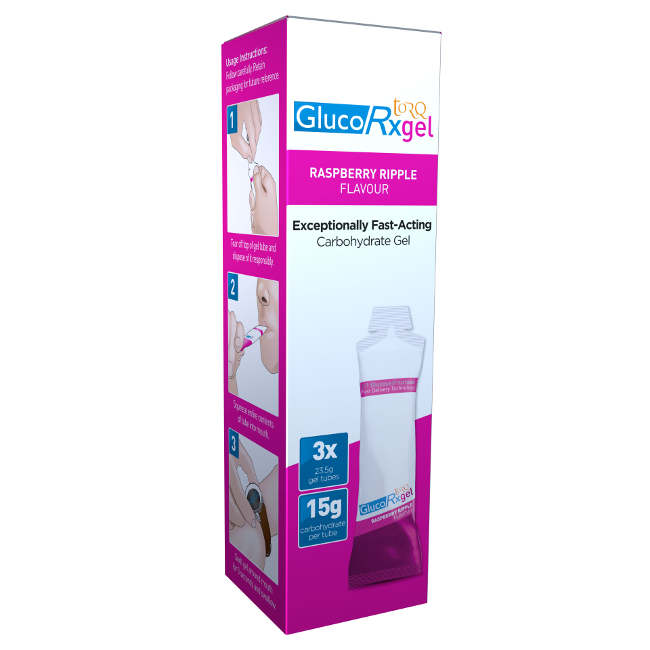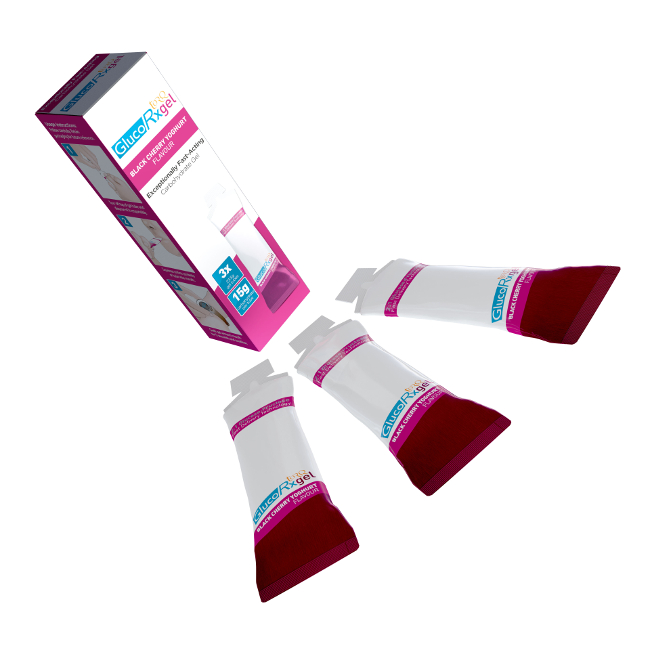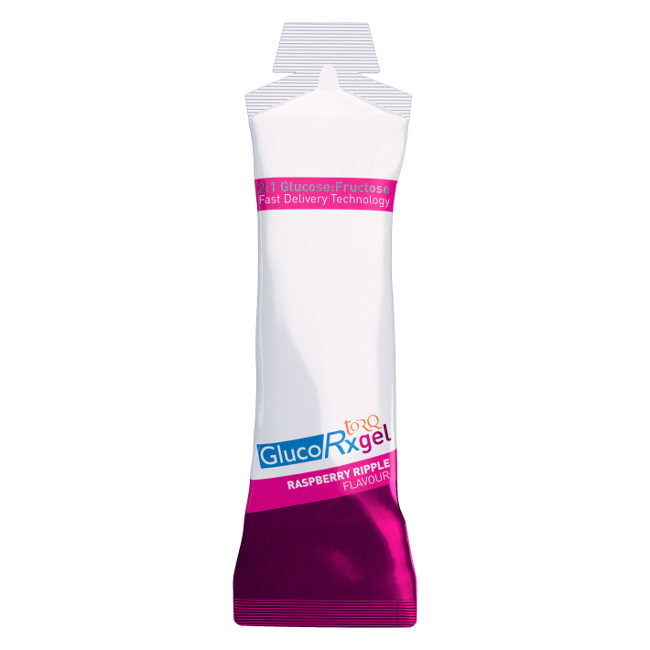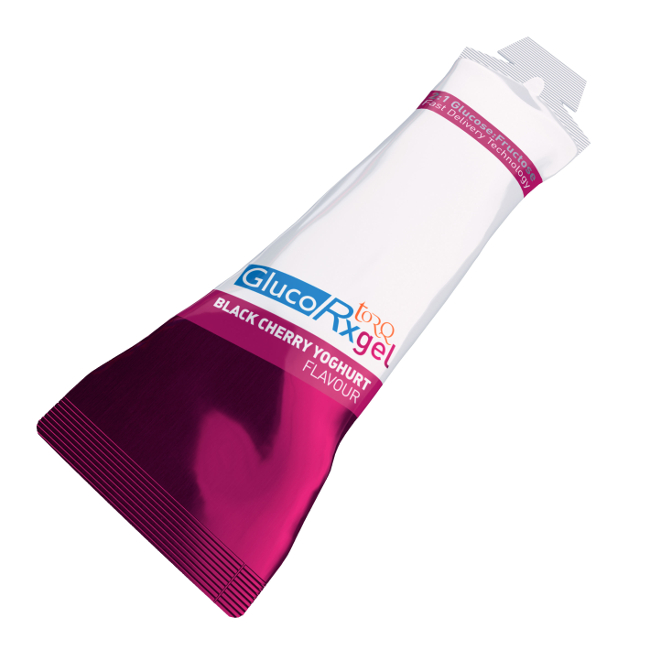Did you know that we have applied the science behind our class-leading TORQ Gel to diabetes?
Over 20 peer-reviewed published research studies support the speed of carbohydrate delivery from our 2:1 Maltodextrin:Fructose formulation and the same technology that provides superior fuelling for endurance athletes also applies to people with diabetes when blood glucose drops – called hypoglycaemia or a ‘hypo’.

TORQ have teamed up with the UK’s leading provider of blood glucose monitoring equipment GlucoRx to get this technology to people with diabetes. The GlucoRx TORQ Gel is now also available on prescription through the NHS. If you have diabetes and need to use a hypo treatment, you can give these PIP Codes to your GP or practitioner to get them prescribed:
Black Cherry Yoghurt Flavour: 408-9728
Raspberry Ripple Flavour: 408-9710
Alternatively, you can purchase the GlucoRx TORQ Gel directly from the GlucoRx website by clicking HERE.

Please share this article with anyone you know who has diabetes as we have had enquiries from individuals recently who have struggled to acquire glucose tablets and other hypo remedies due to the current environment. GlucoRx’s stocks are strong and we will do everything we can to keep them that way.
Learn more about this product by watching this short video:

If you have any questions or require further information, please don’t hesitate in contacting us at enquiries@torqfitness.co.uk or phone us on 0344 332 0852.
Stay safe everyone during this difficult time and look after those around you.

Research References
- Stellingwerff, T & Cox, GR. (2014)
Systematic review: Carbohydrate supplementation on exercise performance or capacity of varying durations. Appl Physiol Nutr Metab. 2014 Sep;39(9):998-1011. - Wilson. PB., Ingraham, SJ. (2015)
Glucose-fructose likely improves gastrointestinal comfort and endurance running performance relative to glucose-only. Scand J Med Sci Sports. [Epub ahead of print]. - Currell, K & Jeukendrup, A.E. (2008)
Superior endurance performance with ingestion of multiple transportable carbohydrates. Med Sci Sports Exerc. 40(2):275–81. - Triplett, D., Doyle, D., Rupp, J., Benardot, D. (2010)
An isocaloric glucose-fructose beverage’s effect on simulated 100-km cycling performance compared with a glucose-only beverage. Int J Sport Nutr Exerc Metab. 20(2):122–31 - Tarpey, M.D., Roberts, J.D., Kass, L.S., Tarpey, R.J., Roberts, M.G. (2013)
The ingestion of protein with a maltodextrin and fructose beverage on substrate utilisation and exercise performance. Appl Physiol Nutr Metab. 38(12):1245–53. - Rowlands, D.S., Swift, M., Ros, M., Green, J.G. (2012)
Composite versus single transportable carbohydrate solution enhances race and laboratory cycling performance. Appl Physiol Nutr Metab. 37(3):425–36. - Baur, D.A., Schroer, A.B., Luden, N.D., Womack, C.J., Smyth, S.A., Saunders, M.J. (2014)
Glucose-fructose enhances performance versus isocaloric, but not moderate, glucose. Med Sci Sports Exerc. 46(9):1778–86. - Rowlands, D.S., Thorburn, M.S., Thorp, R.M., Broadbent, S.M., Shi, X. (2008)
Effect of graded fructose co-ingestion with maltodextrin on exogenous 14C-fructose and 13C-glucose oxidation efficiency and high-intensity cycling performance. J Appl Physiol. 104:1709–19. - O’Brien, W.J & Rowlands, D.S. (2011)
Fructose-maltodextrin ratio in a carbohydrate-electrolyte solution differentially affects exogenous carbohydrate oxidation rate, gut comfort, and performance. Am J Physiol Gastrointest Liver Physiol. 300(1):G181–9. - O’Brien, W.J., Stannard, S.R., Clarke, J.A., Rowlands, D.S. (2013)
Fructose–maltodextrin ratio governs exogenous and other CHO oxidation and performance. Med Sci Sports Exerc. 45(9):1814–24. - Rowlands, D.S., Swift, M., Ros, M., Green, J.G. (2012)
Composite versus single transportable carbohydrate solution enhances race and laboratory cycling performance. Applied Physiology, Nutrition, and Metabolism. 37(3): 425-436. - Smith, J.W., Pascoe, D.D., Passe, D., Ruby, B.C., Stewart, L.K., Baker, L.B., et al. (2013)
Curvilinear dose-response relationship of carbohydrate (0–120 g·h−1) and performance. Med Sci Sports Exerc. 45(2):336–41. - Roberts, J.D., Tarpey, M.D., Kass, L.S., Tarpey, R.J., Roberts, M.G. (2014)
Assessing a commercially available sports drink on exogenous carbohydrate oxidation, fluid delivery and sustained exercise performance. J Int Soc Sports Nutr. 11(1):1–14. - Jentjens, R.L., Underwood, K., Achten, J., Currell, K., Mann, C.H., Jeukendrup, A.E. (2006)
Exogenous carbohydrate oxidation rates are elevated after combined ingestion of glucose and fructose during exercise in the heat. J Appl Physiol. 100(3):807–16. - Jeukendrup, A.E & Moseley, L. (2010)
Multiple transportable carbohydrates enhance gastric emptying and fluid delivery. Scand J Med Sci Sports. 20(1):112–21. - Davis, J.M., Burgess, W.A., Slentz, C.A., Bartoli, W.P. (1990)
Fluid availability of sports drinks differing in carbohydrate type and concentration. Am J Clin Nutr. 51(6):1054–7. - Jentjens, R.L., Venables, M.C., Jeukendrup, A.E. (2004)
Oxidation of exogenous glucose, sucrose, and maltose during prolonged cycling exercise. J Appl Physiol. 96(4):1285–91. - Jentjens, R.L., Achten, J., Jeukendrup, A.E. (2004)
High oxidation rates from combined carbohydrates ingested during exercise. Med Sci Sports Exerc. 36(9):1551–8. - Wallis, G.A., Rowlands, D.S., Shaw, C., Jentjens, R.L., Jeukendrup, A.E. (2005)
Oxidation of combined ingestion of maltodextrins and fructose during exercise. Med Sci Sports Exerc. 37(3):426–32. - Jentjens, R.L., Moseley, L., Waring, R.H., Harding, L.K., Jeukendrup, A.E. (2004)
Oxidation of combined ingestion of glucose and fructose during exercise. J Appl Physiol. 96(4):1277–84. - Jentjens, R.L & Jeukendrup, A.E. (2005)
High rates of exogenous carbohydrate oxidation from a mixture of glucose and fructose ingested during prolonged cycling exercise. Brit J Nutr. 93:485–92. - Fuchs, C.J., Gonzalez, J.T., Beelen, M., Cermak, N.M., Smith, F.E., Thelwall, P.E., Taylor, R., Trenell, M.I., Stevenson, E.J., van Loon, L.J. (2016)
Sucrose ingestion after exhaustive exercise accelerates liver, but not muscle glycogen repletion compared with glucose ingestion in trained athletes. J Appl Physi. [Epub ahead of print].
For reviews see…
Jeukendrup, A.E. (2010) Carbohydrate and exercise performance: the role of multiple transportable carbohydrates. Curr Opin Clin Nutr Metab Care. Jul;13(4):452-7.
Rowlands, D.S., Houltham, S., Musa-Veloso, K., Brown, F., Paulionis, L., Bailey, D. (2015) Fructose-Glucose Composite Carbohydrates and Endurance Performance: Critical Review and Future Perspectives. Sports Med. Nov;45(11):1561-76.






